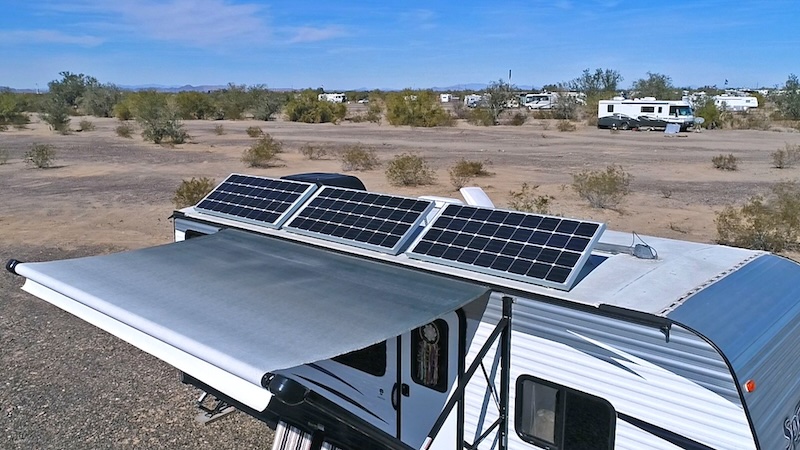Thanks for your support! If you make a purchase using our links in this article, we may make a commission. And, as an Amazon Associate, I earn from qualifying purchases. See the full disclosure here.
Green RVing is becoming popular among RV enthusiasts, providing a sustainable way to enjoy road-tripping. In today’s world, being mindful of our environmental impact is a personal responsibility and a way to enhance our experiences.
The beauty of nature is a significant part of why we love RVing. It makes sense to do our part in preserving it for future generations.
My Dad taught us to always leave our campsite better than how we found it. He believed if everyone lived by this rule, we would all benefit.
But how can you make your RV lifestyle greener?
This blog post will provide actionable tips and insights to help you make your RV adventures as green as possible.
We guide you on eco-friendly choices and practices for RVing.
Let’s begin our journey toward a more sustainable RV lifestyle together. It may surprise you how easy it is to have a positive impact while on the open road.
What Is Green RVing?
Green RVing is incorporating environmentally friendly and sustainable habits into the RV lifestyle. We should all know how our actions affect the environment and make choices to reduce pollution and waste.
Sustainability might sound like a buzzword, but it’s crucial for all to understand and embrace. It’s about using resources wisely and efficiently so they’re still available for future generations.
For RVing, sustainability takes on a unique perspective.
We’re out there enjoying the beauty of nature, exploring the open roads, and experiencing the joy of new destinations. The last thing we want is for our adventures to harm the landscapes we love.
That’s where green RVing comes in. It’s about enjoying our RVing experiences while being mindful of our environmental footprint.
To make RVing more sustainable, we can reduce waste, use eco-friendly products, and practice responsible travel.
Green RVing allows us to continue our love affair with the open road while doing our part to protect and preserve the environment for future RVers.
What Is A Certified Green RV?
A Certified Green RV is an eco-friendly motorhome or travel trailer made with sustainable practices.
This certification is more than just a label. It guarantees that you purchase an environmentally friendly vehicle as a consumer.
The “Certified Green” label signifies that the manufacturing plant where they built the RV adheres to specific green standards. These standards include efficient energy use, waste reduction, recycling programs, and sustainable materials.
The goal is to reduce the carbon footprint of the production process and promote sustainability in the RV industry.
It’s important to note that the criteria for this certification can vary. However, the common thread is focusing on environmental responsibility and sustainable practices.
More and more manufacturers are moving toward obtaining this certification if they haven’t already.
They recognize consumers today are more eco-conscious and factor that into their buying choices.
By offering Certified Green RVs, manufacturers are meeting this demand and contributing to a more sustainable future for all.
10 Best Ways To Practice Green RVing
Green RVing lets us have fun outdoors while being eco-friendly. There are many ways you can make your RV travels more sustainable.
Here are some of the most effective methods:
- Use Solar Power: Installing solar panels on your RV is an excellent way to harness clean, renewable energy. Solar can power your lights, charge your devices, and run other electrical appliances. Plus, it can help you save on fuel costs as well.
We installed 2400 watts of solar panels and 800 amp hours of Battle Born batteries in our rig last year to help reduce our carbon footprint.
- Conserve Water: Be mindful of your water usage. Install water-saving fixtures, and turn off the tap when brushing your teeth or doing dishes. Also, consider using waterless products like dry shampoos and wipes.
We installed a water-saving shower head in our shower and we take Navy showers. This is where we turn off the water while we lather up and then turn it back on to rinse off, which saves a lot of water.
- Consider Electric Tow Vehicles: Electric vehicles are a greener alternative to traditional gas-powered ones. They produce fewer emissions and are more energy-efficient. Consider an electric vehicle for towing if you have a smaller RV or trailer.
- Opt for Boondocking/Unserviced Sites: Camping without hookups, also known as boondocking or dry camping, can be more eco-friendly. It encourages you to be more conscious of resource usage since you’ll rely on your RV’s onboard systems.
Susan and I boondocked more than ever last year to reduce the amount of water and electricity we use while we camp.
- Recycle and Compost: Sort waste into recyclables and compostables. Carry a sturdy recycling container and compost bin, and offload them at the appropriate facilities.
- Buy Local: When shopping for food, try to buy fresh and local. When you buy locally, you help farmers and reduce transportation emissions.
- Leave No Trace: Follow the “Leave No Trace” principles. It is essential to dispose of waste properly, minimize the impact of campfires, and show respect for wildlife and vegetation.
- Drive at or Under the Speed Limit: Driving at slower speeds can help improve your vehicle’s fuel efficiency, reducing your carbon footprint and saving you money on gas.
- Buy a Green-Certified RV: Many manufacturers are going green so finding a certified green RV is easier than ever.
- Composting toilets: This might not be for everyone. However, composting toilets are a great way to eliminate waste and not be dependent on sewer hookups and dump stations.
What Type Of Motorhome Has The Best Fuel Economy?
With fuel economy, the type of motorhome matters. Class B motorhomes, typically smaller and lighter than their Class A and C counterparts, lead the pack in fuel efficiency. In particular, diesel-powered Class B motorhomes often offer the best fuel economy.
The Winnebago Travato 59G stands out as one of the most fuel-efficient Class B models, with a reported average of 18-22 mpg. The Roadtrek RS Adventurous is another high-performing option, boasting an average of 20 mpg.
On the other end of the spectrum, large, gas-powered Class A motorhomes typically have the lowest fuel efficiency, averaging between 6-13 mpg.
However, there are exceptions in this category.
For example, the Thor Palazzo 33.5, Forest River Berkshire, and Newmar Dutch Star are Class A models known for their better gas mileage.
And something to look forward to for eco-conscious RVers: electric Class B RVs are currently developing! This could change the industry with a more eco-friendly and fuel-efficient option for gas and diesel models.
4 FAQs About Green RVing
With the growing awareness of sustainable living, many RV enthusiasts seek eco-friendly travel options.
This has led to a rise in interest in green RVing. Whether you’re new to RVing or a seasoned traveler, here are four frequently asked questions about green RVing.
1. Should I Buy A Certified Green RV?
Investing in a Certified Green RV not only contributes to a sustainable environment but also offers you several advantages:
- Eco-Friendly Production: They manufacture Certified Green RVs in factories that uphold green and sustainable practices, which means you’re supporting businesses that prioritize the environment.
- Certified Assurance: The certification attests to the fact they have built the RV with a focus on minimizing environmental impact. This assurance gives you peace of mind, knowing your vehicle aligns with your environmental values.
- Investment in Sustainability: When you purchase a Certified Green RV, you’re making a meaningful investment in a vehicle that has been thoughtfully designed and produced with our planet’s well-being in mind. This action speaks volumes about your commitment to environmental preservation.
- Energy Efficiency: They often design Green RVs to be more energy-efficient, using renewable resources for power, such as solar panels. In the long run, this can cause significant cost savings.
- Healthier Living Environment: Materials used to construct Certified Green RVs are typically low in volatile organic compounds (VOCs), creating a healthier environment for you and your family.
- Higher Resale Value: Given the increasing awareness and demand for sustainable products, Certified Green RVs can maintain a higher resale value than standard RVs.
- Contribution to Climate Change Mitigation: By choosing a Certified Green RV, you’re playing your part in reducing carbon emissions and contributing to global climate change mitigation efforts.
2. How Do I Know If An RV Is Certified Green?
A Certified Green RV will have a label signifying its status. This label is an assurance the manufacturing plant where the RV was built adheres to specific green standards, which could include measures like efficient energy use, waste reduction, recycling programs, and sustainable materials.
3. Is Boondocking Better For The Environment Than Campgrounds?
Boondocking, known as dry camping, can be more eco-friendly than camping at campgrounds. It encourages you to be more conscious of resource usage since you’ll rely on your RV’s onboard systems rather than hookup facilities. However, following the “Leave No Trace” principles is essential to minimize your environmental impact.
4. Are There Electric RVs?
There are electric RVs currently in development. These vehicles promise to revolutionize the industry by offering a far more sustainable and fuel-efficient alternative to traditional gas and diesel models.
Final Thoughts About Green RVing
Choosing a Certified Green RV is a significant step towards a sustainable and responsible lifestyle.
In an era where caring for the environment is paramount, this choice reflects an admirable sense of responsibility.
The advantages of Green RVing are comprehensive. The energy efficiency of these vehicles can lead to substantial cost savings. Plus, the low VOC materials used in their construction create a healthier living environment for you and your loved ones.
These eco-friendly RVs can also have a higher resale value, reflecting the increasing demand for sustainable products.
One of the best benefits is knowing your decision helps reduce carbon emissions and protect the planet for future generations.
Green RVing combines environmental responsibility with personal benefits. It’s a choice that aligns with core values, balancing enjoying life’s adventures and preserving the natural world.
So, as you plan your next journey, consider making it green. It’s a decision that will resonate positively now and in the future.
Remember, every journey begins with a single step, and choosing a green one can make all the difference.
Related Reading:
–5 Best Solar Generators For Van Life
–Beginners Guide To RV Solar Panels
–How To Charge An E-bike While Camping
–5 Most Fuel-Efficient Campervans
Mike Scarpignato – Bio
Mike Scarpignato created RVBlogger.com over five years ago in 2018 to share all we have learned about RV camping.
Mike is an avid outdoorsman with decades of experience tent camping and traveling in his 2008 Gulf Stream Conquest Class C RV and 2021 Thor Challenger Class A motorhome.
We attend RV Shows and visit RV dealerships all across the country to tour and review drivable motorhomes and towable trailers to provide the best evaluations of these RVs in our blog articles and YouTube videos.
We are 3/4-time RVers who created RVBlogger.com to provide helpful information about all kinds of RVs and related products, gear, camping memberships, tips, hacks and advice.


